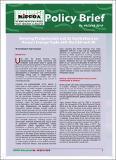| dc.description.abstract | Until after the global financial crisis, interdependence of world economies and increased cross-border trade in goods and services underpinned the growth of world economies. World trade grew faster than output by around one and a half times since 1991. At the same time, there was increasing degree of openness in trade, rapid developments in information and communication technology, falling cost of transportation and increasing in cross-border activities, with more domestic companies increasingly being involved in international trade. However, the unprecedented 12.2% decline in world trade in 2009 triggered a rapid descent into protectionism to shield domestic businesses and jobs from foreign competition. Anti-globalization rhetoric also gathered momentum especially in the US and most parts of Europe. Indeed, the world’s top 60 economies introduced 7,000 protectionist trade measures since the financial crisis. Thus, the impact of the crisis quickly depressed economic indicators, raised the levels of inequalities and social deprivation, and fueled resentments against free trade. Subsequently, the backlash against progressive cultural changes brought about by greater global openness and the threats associated with international migration and terrorism added even greater impetus to proponents of protectionism.. | en |

